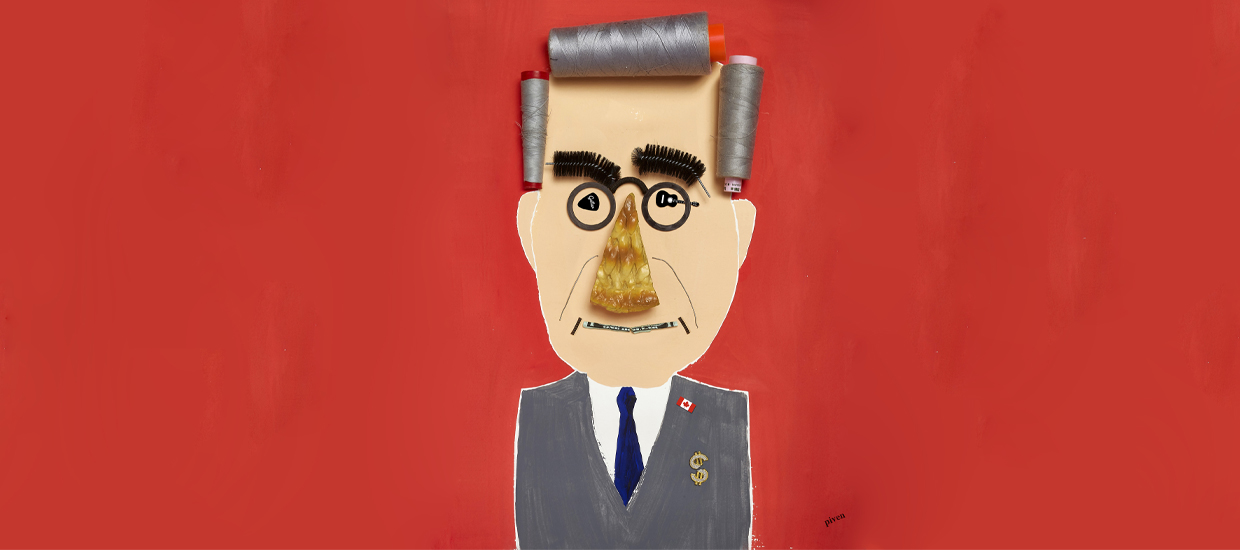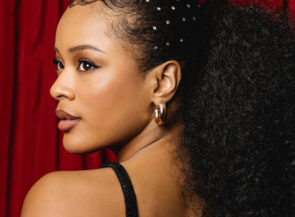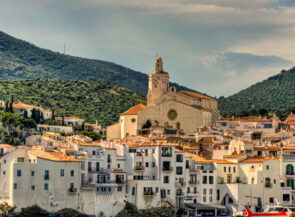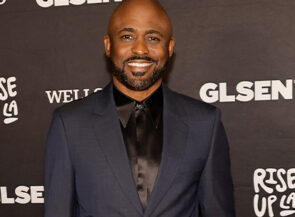The intro to Eugene Levy’s new Apple TV+ show begins with him quoting St. Augustine. “The world is a book, and those who don’t travel read only one page,” the Canadian character actor intones in his trademark nasal deadpan, before offering his own response: “Well I’ve gotta say, I’ve read a few pages, and I’m not crazy about the book.” Everyone, meet The Reluctant Traveler.
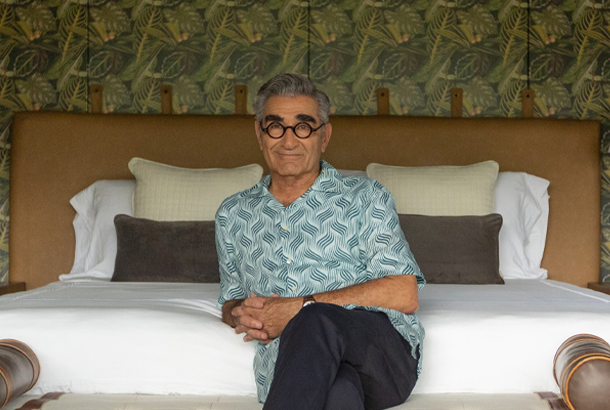
After playing a clothing salesman with two literal left feet in Best in Show, a bumbling dad in American Pie, and a fallen video rental magnate in Schitt’s Creek, Levy, 76, is taking on the role of tour guide, whisking viewers off to Japan, South Africa, Italy, and more—even though he really doesn’t want to go anywhere. As the show’s title implies, Levy is no Anthony Bourdain, no Rick Steves. He’s not eager to jump into an icy lake in Finland or go on a night hike in the Costa Rican rainforest. When he’s confronted with such a task, he responds by raising his fabulously fluffy eyebrows in terror and saying “oh my God”—but then he does it. He might even enjoy it, surprising as that is to him.
“It’s really been a good show for me, kind of facing a lot of demons, being able to crawl out of my comfort zone,” Levy says, calling from his home in Los Angeles. “I really like familiarity. It’s not something to be proud of, but it’s just who I am. I think there’s probably a lot of people out there that feel the same way. This show will hopefully appeal to people who love to travel and people who don’t.”
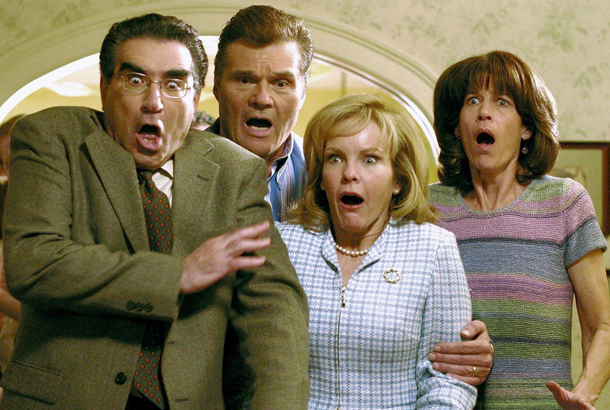
It seems, based on past interviews I’ve read, that you have a history of having to be talked into a production: You were hesitant when Christopher Guest asked you to make Waiting for Guffman, you told the American Pie producers no, and you initially declined when Apple pitched you The Reluctant Traveler. So, are you reluctant just when it comes to travel—or in general?
What is the matter with me? [Laughs.] Well, we won’t go into the American Pie thing or Christopher Guest thing, but here’s the deal with this, and call me crazy: I get a call from my agent saying, “Well, Apple wants to talk to you about hosting this travel show about hotels where you’ll go all over the world.” Initially, it was called Room with a View or something. And I said, “Wow, OK.” And I’m thinking, That sounds exciting—but do they have the right guy?
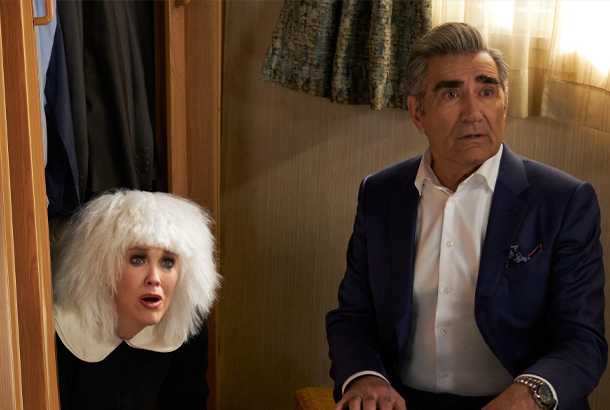
Well, you did run the Rosebud Motel on Schitt’s Creek for six years.
It’s not that I hate traveling. I don’t. I don’t love traveling. I don’t love the sightseeing experience. I don’t have a great sense of adventure, and I’m not a really curious person. I said, “You’ve got the wrong person.” So then my agent said, “They really want to pursue you; they want to talk to you.” And I’m thinking, Geez, I don’t know what the point is, but sure. I’ll talk to them myself. So we have the call, and I’m going through my list of excuses as to why I’m not the right person, and we ended the call, and I thought to myself, Good job on that one. And then what happened on the other end was, the producer of the show and the Apple executive got on a call right after that, and they said, “No, that’s the show: It’s about somebody who doesn’t like doing all this traveling.” So they called me back and they pitched that version, and I understood that. I said, “All right. I kind of get that.” But again, I don’t know whether I’m the right person.
Why not?
I’m not a chitchatter. I’m kind of shy, I’m usually not the person initiating conversations with people. I may not be the person [for the show], but lo and behold, I’m glad they didn’t listen to me, because it’s been a really good show for me, because I had to work through some things—I was just nervous about doing it on the air.
Did you travel growing up? What was your first big family trip?
Well, I don’t think we ever had a big family trip. We grew up in Hamilton, [Ontario]. My dad was a working-class guy. He had a two-week vacation every summer, and we would go from our hometown, Hamilton, to a beach on Lake Erie called Crystal Beach. They had cottages; there was an amusement park. Every single year we made the same trip, and we loved it. We loved it. That was our vacation. You pack up the car, and you drive two hours, and there you are. We didn’t know any different.
So what was the first big trip you took on your own?
I guess it probably would’ve been my first time to Los Angeles, where you’re actually in a different climate. You’re in a different part of the world, you’re looking up at palm trees—very exotic. That was exciting. I was in Second City in Toronto, and we moved down to open a show in Pasadena. So that trip was kind of like, Wow. You’re really doing it now.
A lot of people know you from your films with Christopher Guest, in which you write the outlines for the plot but then improvise the dialogue. Is doing a show like The Reluctant Traveler similar territory, in that you’re mapping it out but then improvising your way through the story?
Well, that’s kind of an interesting point. You are getting an outline for the show in terms of who you’re going to be meeting and where you’re going to be going, so that’s true. That’s identical to how we plotted those movies. The difference is, I’m not in character on this one. It’s just me. [I’ve spent my] life as a character actor, and the further the character was from me, the more comfortable I was. Schitt’s Creek, that’s as close as I’ve come to playing myself, and yet it was still a character. The Reluctant Traveler is just me as myself, and that always made me uncomfortable—to be out there as myself.
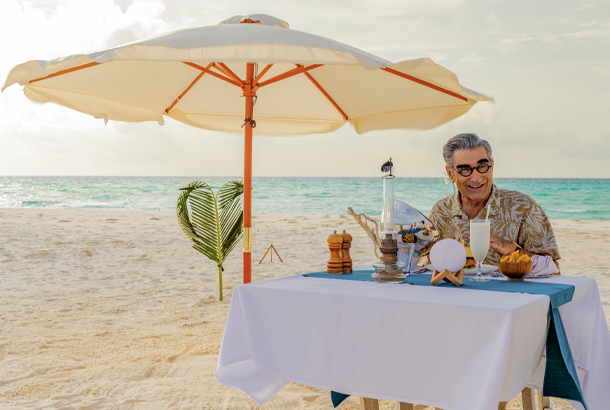
The first place you filmed was the Maldives. What was that like?
The tough thing for me in that first episode was, well, it’s kind of like acting, but it’s not. It’s me. So my natural reactions were tough to get a hold of, because I’m just not used to being me in front of a camera. With Waiting for Guffman, with Chris Guest, we did the script together, and then my first scene, I went to Chris and said, “OK, where are we going to rehearse this?” And he said, “What do you mean? There’s no rehearsing. There’s the camera: We’re going to do it in front of the camera.” So, that was a bit of an eye-opener—and everything I was doing in the Maldives was a bit of an eye-opener.
Well, I think you do a great job being yourself! I watched three episodes, and the transformations you experienced seem genuine.
Well, it took time. By the time we got to Utah and Finland, things were actually hitting me in a very real way. Utah, to me, was the most spiritual experience of all the locations. And Finland was, I think, the most fun.
The people you meet—the guides, the locals, the hotel owners—have a big impact on you. One of the main takeaways is the relationships you form, what you learn from them, the way you’re able to see how they view life.
It all comes down to the people. By the end of it, kind of looking back and trying to figure out what was the experience that I had, it is basically that the charm was the people that I met. It’s not about what I was seeing, necessarily, but it really was about the people I was meeting.
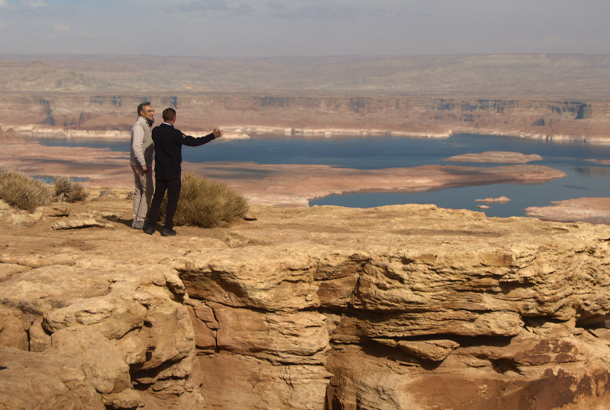
There are a lot of moments of you pushing past your fears and trying new things: flying in a helicopter in Utah or walking across a suspension bridge in Costa Rica. What was the toughest hurdle?
I do have an incredible fear of heights, so getting in a helicopter, for instance, was not something I was looking forward to. I can’t really look down when I’m on somebody’s balcony. A lot of things I was forced to do—not forced to do, but I knew I had to do, because that’s truly what the show was. What if I just said no to everything that was proposed? Because that’s the way things would’ve been if I was on a trip and somebody said, “Hey, why don’t we go across the suspension bridge?” I’d say, “You guys go and let me know how much fun you had when you get over it.” I just wouldn’t have done it.
While you may not be a fearless traveler, you’ve always seemed fearless in your comedy.
Well, it’s funny. I don’t know whether fearless is a word I would’ve used for me. I’ve never really thought of myself as somebody who takes chances, even in my work. Most of the stuff, to me, seems pretty safe. Comedically outlandish maybe, but still kind of safe to me. But to someone else’s eyes maybe it would be. I generally like to do things that are comfortable and natural. Comedy, to me, has to be grounded—it has to be grounded in a truth and grounded in reality. And certainly the best comedy, to me, is where you can not only make people laugh, but you can also make them cry, because you’ve created characters that are indelible for the audience. They’re kind of real. They can make you laugh, and therefore, if you go another way, if you take a more dramatic turn, you can also keep the audience with you. When you don’t have that reality going with your comedy, you can’t make that turn. You can only go one way on a one-way street.
Yeah, there is always heart in your comedy. In the Finland episode, which is my favorite, you joke about how it’s the world’s happiest country and that you don’t trust people who are happy all of the time. But I realize that’s kind of your job: You are in the business of making people happy.
Well, I think there may be a slight difference in making people feel good for a limited amount of time. [Laughs.] If you’re watching this movie or this show, I hope you have a couple of good laughs. But if you’re laughing all day? What’s that about?
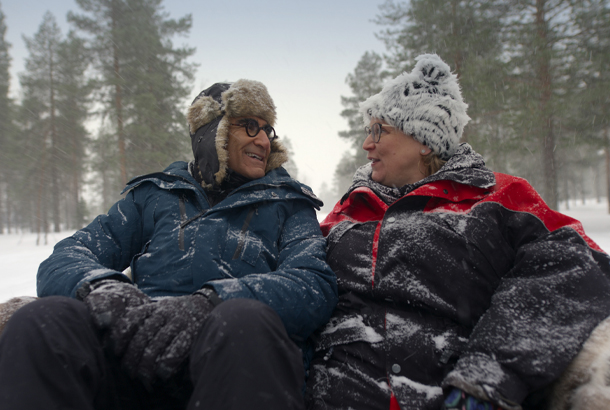
Fair enough.
I honestly don’t know anybody who can be on that kind of an upswing 24-7. It just doesn’t seem human to me. But I have to say, the Finns are the happiest people that I have encountered—certainly on the eight trips I was on. And a lot of that might have to do with them being big vodka drinkers.
